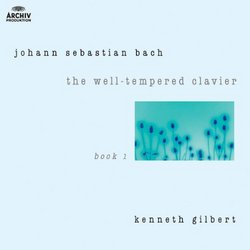| All Artists: Johann Sebastian Bach, Kenneth Gilbert Title: Bach: The Well-Tempered Clavier, Book 1 Members Wishing: 0 Total Copies: 0 Label: Archiv Produktion Release Date: 4/8/2003 Album Type: Original recording remastered Genre: Classical Styles: Chamber Music, Forms & Genres, Improvisation, Historical Periods, Baroque (c.1600-1750), Classical (c.1770-1830) Number of Discs: 2 SwapaCD Credits: 2 UPC: 028947422129 |
Search - Johann Sebastian Bach, Kenneth Gilbert :: Bach: The Well-Tempered Clavier, Book 1
 | Johann Sebastian Bach, Kenneth Gilbert Bach: The Well-Tempered Clavier, Book 1 Genre: Classical |
Larger Image |
CD Details |
CD ReviewsBeth -- You're a Dope James Abraham | Boston, MA | 01/17/2005 (5 out of 5 stars) "To correct two of the previous reviewers: 1. They didn't mistakenly tune it down a whole tone -- "reference" pitch varied and changed all over Europe since the beginning of western music. Depending on the instrument and the country, A has varied from a low of about 360 Hz to a high of about 460. However, it is undeniable that pitch has been creeping up for centuries. So, for Bach's time, A=440 would have sounded probably a semitone SHARP. 2. There is no relationship between pitch and temperament. Temperament refers to the distribution of "the comma"; the reference pitch is merely the starting tone." Even-Tempered Bach... Sébastien Melmoth | Hôtel d'Alsace, PARIS | 08/26/2007 (5 out of 5 stars) ". Kenneth Gilbert's 1983 traversal--(remastered and reissued, 2003)--is a very even-tempered reading of the great 24. Gilbert performs on quite an old small instrument: a Flemish double-manual harpsichord of 1671. This is not an huge-monster harpsichord, but rather more akin to the clavichord--that is, having fewer strings and therefore a smaller, thinner sound: lovely. The recorded ambience is wonderful: this performance was miked properly. As for Gilbert's realizations, he takes a very balanced, even-handed approach. His timing is steady; his dynamics, by no means excessive. I highly esteem Gilbert's realization; indeed, rate it with Kirkpatrick's Well Tempered Clavier, Part 1 on clavichord, and Gould's The Glenn Gould Edition - Bach: The Well-Tempered Clavier, Book I on piano. By the way, while WTC Book 2 features some interesting and excellent preludes and fugues, they are much more uniform than Book 1 which includes very exceptional and eccentric pieces--therefore of more aesthetic value. ." An excellent surprise!! Peter von Karajan | Dresden, Deutschland | 11/26/2003 (5 out of 5 stars) "I used to think that the only names related to Bach's keyboard masterpieces were Moroney, Leonhardt, Gould or Pinnock. I was wrong. In this recording i found an exquisite universe full of poetic interpretations, a reflexion of this masterpiece, a supreme virtousism. Gilbert, who was unknown to me until i bought this record, revealed to my personal experience about Bach, another point of view, as truthfull to the baroque as Leonhardt. Gilbert plays in a french style, softly, joyfully and with great inspiration. It is a good note to say that these interpretations were made in a Harpsichord of Gilbert's own collection; there's no doubt about the close relationship between the master and the "klavier", they are like two lovers."
|
